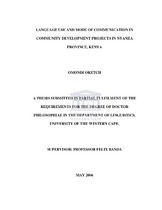Language use and mode of communication in community development projects in Nyanza province, Kenya
Abstract
The concept of community development is founded on the premise that changes in the living conditions of people are best effected by the people themselves. The term community evokes the idea of a homogeneous social group who can recognise their common interests and work together harmoniously for their common good. The concerns of the leading development agents and donors in the past two decades have been on empowering communities to participate in their own development by taking control of decisions and initiatives that seek to improve their living conditions. The zeal to address these concerns has in the past decade been pushed with such resounding statements that people’s participation in development projects has not only been seen as a basic human right, but also as an imperative condition for human survival. It has been strongly argued in the UNDP reports that the overall development strategy is to enable people to gain access to a much broader range of opportunities.From this perspective, development as a social activity seeks to ensconce economic liberalisation, freedom of association, good governance and access to free market economy as the guiding tenets of an improved life in all communities in the world. The realization of this dream posed a major challenge to many governments in the Third World and the 1980s saw the emergence of ‘associational revolution’ – the proliferation of small-scale non governmental organizations (NGOs) with relative autonomy from the state. The mainstream development agencies perceived the NGOs as the best instruments to instigate changes in the living conditions of the poor and the disadvantaged people. For this reason, NGOs became increasingly instrumental in implementing development objectives in the rural and disadvantaged communities. Development in this sense consists of processes in which various groups are stimulated to improve aspects of their lives particularly by people from outside their community. This has drawn attention to how these outsider- development agents communicate development information particularly due to the sociolinguistic situation in many rural African communities. The real concern is with is that the target majority of the people in the rural areas are not speakers of the dominant languages of the development discourse, in most cases this is the official foreign languages taught in schools.Communication is a fundamental part in community development programmes and language emerges as a key factor in effective communication and implementation of these programmes. While it is evident that social interactions are sustained by agreeable communicative principles, the role of language and the different mode of communication applied to development interventions have received very little attention from the parties concerned. This has yielded detrimental repercussions in the quality of interaction at the grassroots level. More often than not, it is assumed that once there is a common language, effective communication will take place and for this reason language use and mode of communication are never given much thought in the field of development interaction.

